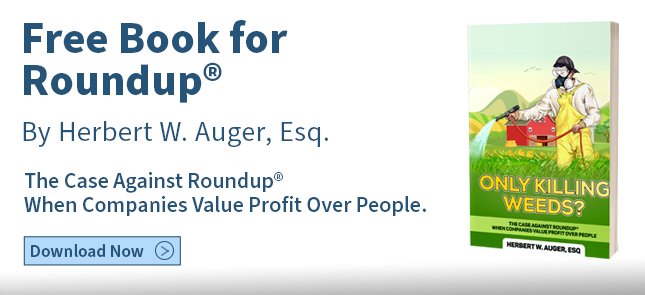Roundup has become one of the most popular weed killers across the globe. However, it is made primarily with glyphosate, which has recently been discovered to be a carcinogen. Specifically, this chemical is known to cause non-Hodgkin’s lymphoma. Recent lawsuits have resulted in lawsuits worth tens of millions of dollars. If you have developed non-Hodgkin’s lymphoma and have had heavy exposure to Roundup or similar herbicides, you may be entitled to financial compensation through an individual or class action lawsuit.

The Greensboro Roundup lawsuit lawyers at Auger & Auger are here to ensure you get the fair treatment you deserve. Our experienced Greensboro injury attorneys know how to build a strong case on your behalf with the help of herbicide industry experts, legal professionals, doctors, and others to make sure your case is as strong as possible.
There are numerous people who may have developed cancer as a result of exposure to Roundup, whether you’re a professional farmer or you just eliminate weeds in your driveway. No matter your situation, we’re here to hold Roundup manufacturer Monsanto and its parent company Bayer accountable.
Our firm is client-focused, and we don’t charge a dime unless we win your case. Give us a call at (336) 346-1963 or contact us online today for a free, no-obligation consultation. We’ll evaluate your case at no cost to you to help you determine your best legal options.
Why Monsanto Is Being Held Accountable
In 1974, Monsanto released a new herbicide trademarked as “Roundup.” Its main chemical, glyphosate, was regarded as a “miracle herbicide” because it was cheap, effective, and considered environmentally friendly. At least, it was considered much less toxic than DDT, the prevailing herbicide at the time, which was known to be dangerous to humans and animals.
Roundup saw immediate success in the agricultural community, and Monsanto reaped the benefits. It was used around the globe thanks to its price and effectiveness. In 1996, Monsanto reached new profit heights when it released genetically-modified crops that were “Roundup Ready,” meaning they were completely resistant to glyphosate. Because Roundup could be applied directly to crops and weeds without affecting the crops, the herbicide became the most successful in history.
At this point, more than 160 countries used over 1.4 billion pounds of Roundup combined every year. What’s more, these “Roundup-ready” crops (and other similar herbicide-resistant crops( accounted for at least 90 percent of all GMO crops worldwide.
Though glyphosate was considered a miracle herbicide, there were consequences. The chemical infiltrated the environment, seeming into waterways and getting into the air. During one study, over a third of tested waterways had detectable amounts of the herbicide..It was also found in popular grains used in foods — even grains that were considered organic.
After these studies were conducted, other research found that people who regularly work with Roundup and similar herbicides had an increased risk of cancer. The International Agency for Research on Cancer confirms that glyphosate was “probably carcinogenic to humans,” their second-most serious classification.
Lawsuits Against Monsanto for Glyphosate-Caused Cancer
Even though studies showed glyphosate was (at the very least) dangerous to humans and animals, Monsanto and its parent company Bayer continued to sell the product and was “as safe as table salt.” Yet, they continually fought against the scientific community that was attempting to spread the truth about the product. In fact, Monsanto co-sponsored studies that showed glyphosate was safe and even considered ghostwriting a study that would show the chemical was harmless.
All of this came to light when Dewayne “Lee” Johnson filed a lawsuit against Monsanto when he developed non-Hodgkin’s lymphoma after using Roundup in his job as a groundskeeper. He suspected Roundup was the cause and filed a lawsuit against Monsanto. During that lawsuit, it was discovered that Monsanto was covering up evidence regarding the dangers of Roundup. Johnson was originally awarded nearly $290 million in damages, which was later reduced to $78 million.
After that lawsuit, nearly 8,000 similar suits were filed against Monsanto and Bayer. These lawsuits revealed that the companies deliberately suppressed evidence regarding the dangers of Roundup to ensure they still turned a profit on the herbicide, rather than doing their duty in warning the public about these dangers.
These lawsuits resulted in large settlements, ranging from $80 million to over $2 billion (though the latter was later reduced). Regardless of the outcomes, these lawsuits show that Monsanto can be held accountable for their negligence. Now, there is a large class action Monsanto Roundup lawsuit that anyone affected in Greensboro can join.
Do I Have Non-Hodgkin’s Lymphoma?
Non-Hodgkin’s lymphoma is the most common type of cancer associated with heavy exposure to Roundup. This cancer may manifest itself in many ways. Some of the most common sub-diagnoses of non-Hodgkin’s lymphoma include:
- Follicular lymphoma
- Hairy cell leukemia
- Chronic lymphocytic leukemia
- Mantle cell lymphoma
- Diffuse large B-cell lymphoma
There are numerous symptoms if this type of cancer. Experiencing any or all of them DOES NOT automatically mean you have cancer. In fact, these symptoms are similar to those of high stress in many people. However, if you were heavily exposed to Roundup and experience these symptoms, you should visit your doctor as soon as possible:
- Constant fatigue
- Unexplained weight loss
- Swollen but painless lymph nodes in the neck, armpits, or groin
- Night sweats
- Shortness of breath
Those who are most likely to develop non-Hodgkin’s lymphoma as a result of exposure to glyphosate are those who used the chemical on a regular basis at their job. These people may include:
- Farmers
- Professional gardeners
- Landscape workers
- Groundskeepers
People in Greensboro who live near facilities like farms that use large amounts of Roundup may have also been heavily exposed through the air or groundwater. In some cases, people who used Roundup in commercial applications may have also been exposed to glyphosate in such a way that they would be at a higher risk of developing cancer.
Work with a Greensboro Roundup Lawsuit Lawyer to Maximize Your Chances for Fair Compensation
While Roundup cancer lawsuits are the most common for exposure to glyphosate, they aren’t the only options you have. Glyphosate is sold under a number of different names, including:
- Enforcer
- Kleeraway
- Bonide KleenUp
- Bayer Advanced DuraZone
- Spectracide
- Hi-Yield Killzall
- Rodeo
And more.
If you regularly used one of these other-named herbicides and later developed cancer, you may still be entitled to compensation. At Auger & Auger Accident and Injury Lawyers, our Greensboro Roundup weed killer lawsuit attorneys are here to help you explore all of your legal options. We have the skills and knowledge to take your case to court and fight for your individual compensation. We are also intimately familiar with the current class-action lawsuit(s) against Monsanto and Bayer and can help you determine if you qualify to be part of the class. Our firm is client-focused, and we don’t charge a dime unless we win your case. Give us a call at (336) 346-1963 or contact us online today for a free, no-obligation consultation. We’ll evaluate your case at no cost to you to help you determine your best legal options.















